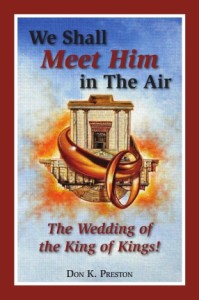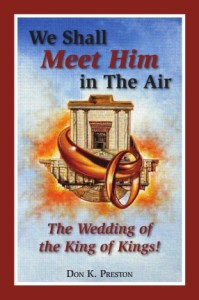Short Shot: Wedding-Parousia-Kingdom

A Short Shot– Connecting Some Important Dots; Wedding-Parousia-Kingdom
In my YouTube study of the Olivet Discourse I have shared a plethora of arguments that demonstrate the unity of the Olivet Discourse. In this very short article I want to share with our visitors how easy it is to prove that the Olivet Discourse is not divided into two distinct and separate subjects, i.e. the AD 70 judgment of Jerusalem, and the “end of the Christian age.”
First of all, it is assumed by most commentators that in Matthew 24:3 the apostles asked about two subjects: The Lord’s coming against Jerusalem and the temple when they asked Jesus “Tell us, when shall these things be?” This supposedly refers to Jesus’ prediction of the coming destruction of Jerusalem and the temple (Matthew 23:37 / 24:2). Then, however, we are told that the apostles confusedly conflated that destruction with the end of the Christian age and the end of time. That is supposedly the focus of their question: “And what shall be the sign of your coming and the end of the age?” (Matthew 24:3). So, the majority assumption is that there are two subjects in view.
Second, this view then posits that in Matthew 24:4-34 (or 35), Jesus discussed the coming horrific events of the Jewish War that would terminate in the utter destruction of the city and temple. But in verse 36, when Jesus said “but of that day and hour knows no man, but the Father only” this is supposedly the “continental divide” of the Discourse. Jesus is supposedly changing subjects from the end of the Old Covenant age, and now turns to discuss the end of the Christian age.
With these preliminaries in mind, it is easy to see that Matthew 25:1-13, and the parable of the coming of the Bridegroom, the five wise and five foolish virgins, is always posited as an “end of time” coming of the Lord. But, let’s look deeper, examining the prophetic background and source of this parable.
It must be kept in mind that God had been married to Israel, through the giving of the Law of Moses (Jeremiah 31:29f). But, the ten northern tribes violated that covenant, through idolatry, and God wrote her a bill of divorcement (Hosea 2 / Jeremiah 3:1-5). When He divorced Israel He “departed” (Hosea 5:15). However, the Lord promised that in the last days, He would return and remarry Israel (Hosea 1:10 / 2:19-23; 3:3-5 / Isaiah 62, etc.). Notice particularly Isaiah 62:3-12: (some verses omitted for brevity):
You shall no longer be termed Forsaken, Nor shall your land any more be termed Desolate; But you shall be called Hephzibah, and your land Beulah; (married, DKP), For the Lord delights in you, And your land shall be married. For as a young man marries a virgin, So shall your sons marry you; And as the bridegroom rejoices over the bride, So shall your God rejoice over you. I have set watchmen on your walls, O Jerusalem; They shall never hold their peace day or night. You who make mention of the Lord, do not keep silent, And give Him no rest till He establishes And till He makes Jerusalem a praise in the earth. … Go through, Go through the gates! Prepare the way for the people; Indeed the Lord has proclaimed To the end of the world: “Say to the daughter of Zion, ‘Surely your salvation is coming; Behold, His reward is with Him, And His work before Him.’ ” And they shall call them The Holy People, The Redeemed of the Lord; And you shall be called Sought Out, A City Not Forsaken.
Notice that this promised Wedding would be at the coming of the Lord: “Say to the daughter of Zion, ‘Surely your salvation is coming; Behold, His reward is with Him, And His work before Him.’”
So, the Wedding / Remarriage of the Lord would be at the coming of the Lord in judgment and reward. This is nothing less than the promise of the coming of the Kingdom of Messiah and I know of no one that seriously challenges or questions this.
Now, notice Matthew 16:27-28:
For the Son of Man will come in the glory of His Father with His angels, and then He will reward each according to his works. Assuredly, I say to you, there are some standing here who shall not taste death till they see the Son of Man coming in His kingdom.
Here we have the coming of the Lord which was to be in fulfillment of Isaiah 62. If these are not the same coming, then proof must be given– proof that does not exist. Both speak of the coming of the Lord. Both speak of that coming as the time of the kingdom and salvation. Both speak of the coming of the Lord in judgment.
Now, notice Matthew 25:1-13, where we have the coming of the Bridegroom for the Wedding. Is this a different Wedding from that of Isaiah 62? No, patently not. So
The coming of the Lord of Matthew 25:1-13 is the coming of the Lord for the Wedding at the time of the kingdom.
The coming of the Lord for the Wedding is the coming of the Lord at the time of the judgment and the kingdom of Isaiah 62.
The coming of the Lord at the time of the judgment and the Kingdom of Isaiah 62 is the coming of the Lord at the judgment and the kingdom of Matthew 16:27-28.
But, the coming of the Lord at the time of the judgment and the Kingdom of Matthew 16:27-28 is the coming of the Lord was to be in the first century generation.
Therefore, the coming of the Lord of Matthew 25:1-13, the coming of the Lord for the Wedding at the time of the kingdom, was to be in the first century generation
Connecting the dots between Isaiah 62–> Matthew 16:27-28—> Matthew 25:1-13 proves beyond any successful response, that the Lord’s second coming, for the Wedding, was in the first century.
Get a copy of my book: We Shall Meet Him In the Air: The Wedding of the King of kings, for more on this important subject.

Hits: 0
The post Short Shot: Wedding-Parousia-Kingdom first appeared on DonKPreston.com.